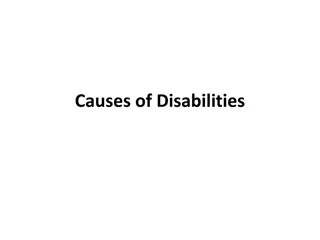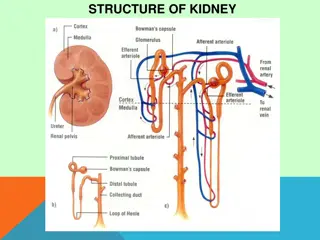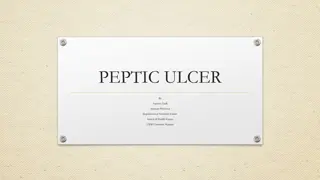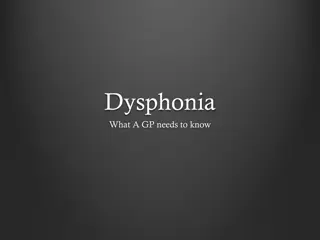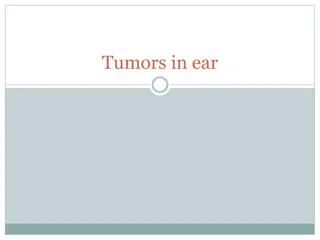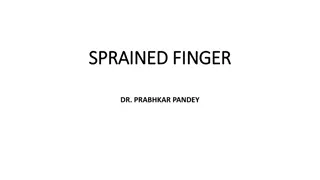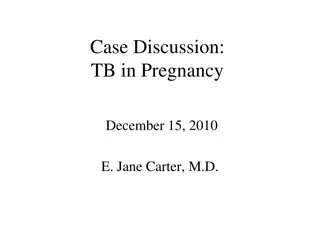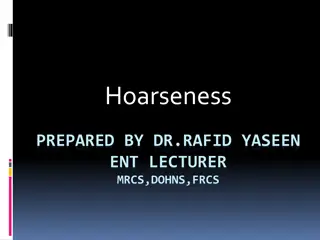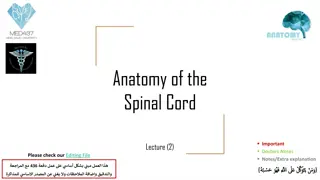Laryngitis: Symptoms, Causes, and Treatment
Laryngitis is inflammation of the voice box, causing hoarseness. Learn about its symptoms, when to seek medical help, types, causes, and prevention. Discover the importance of proper diagnosis and treatment.
Download Presentation

Please find below an Image/Link to download the presentation.
The content on the website is provided AS IS for your information and personal use only. It may not be sold, licensed, or shared on other websites without obtaining consent from the author.If you encounter any issues during the download, it is possible that the publisher has removed the file from their server.
You are allowed to download the files provided on this website for personal or commercial use, subject to the condition that they are used lawfully. All files are the property of their respective owners.
The content on the website is provided AS IS for your information and personal use only. It may not be sold, licensed, or shared on other websites without obtaining consent from the author.
E N D
Presentation Transcript
StudyMafia.Org Laryngitis Submitted To: Submitted By: Studymafia.org Studymafia.org
Table Contents Definition Introduction Symptoms of Laryngitis When to See a Doctor? Types of Laryngitis Causes of Laryngitis Risk-Factors of Laryngitis Prevention of Laryngitis Diagnosis of Laryngitis Treatment of Laryngitis Conclusion 2
Definition Laryngitis is an inflammation of your voice box (larynx) from overuse, irritation or infection. 3
Introduction But with laryngitis, your vocal cords become inflamed or irritated. This makes the vocal cords swell, which distorts the sounds produced by air passing over them. As a result, your voice sounds hoarse. Laryngitis may be short-lived (acute) or long lasting (chronic). Most cases of laryngitis are triggered by a temporary viral infection and aren't serious. Persistent hoarseness can sometimes signal a more serious underlying medical condition. 4
When to See a Doctor? You can manage most acute cases of laryngitis with self-care steps, such as resting your voice and drinking plenty of fluids. Strenuous use of your voice during an episode of acute laryngitis can damage your vocal cords. Make an appointment with a doctor if your laryngitis symptoms last more than two weeks. 7
When to See a Doctor? Seek immediate medical attention if you: Have trouble breathing Cough up blood Have a fever that won't go away Have increasing pain over weeks Makes noisy, high-pitched breathing sounds when inhaling (stridor) Drools more than usual Has trouble swallowing 8
When to See a Doctor? Although croup can usually be treated at home, severe symptoms require medical attention. These symptoms can also indicate epiglottitis, an inflammation of the tissue that acts as a lid (epiglottis) to cover the windpipe (trachea), which can be life- threatening for children and adults. 9
Types of Laryngitis Acute laryngitis Most cases of laryngitis are temporary and improve after the underlying cause gets better. Causes of acute laryngitis include: Viral infections similar to those that cause a cold Vocal strain, caused by yelling or overusing your voice Bacterial infections, although these are less common 10
Types of Laryngitis Chronic laryngitis Laryngitis that lasts longer than three weeks is known as chronic laryngitis. This type of laryngitis is generally caused by exposure to irritants over time. Chronic laryngitis can cause vocal cord strain and injuries or growths on the vocal cords (polyps or nodules). 11
Causes of Laryngitis Inhaled irritants, such as chemical fumes, allergens or smoke Acid reflux, also called gastroesophageal reflux disease (GERD) Chronic sinusitis Excessive alcohol use Habitual overuse of your voice (such as in singers or cheerleaders) Smoking 12
Causes of Laryngitis Bacterial or fungal infections Infections with certain parasites Cancer Vocal cord paralysis, which can result from nerve injury due to surgery, injury to the chest or neck, cancer, nerve disorders, or other health conditions Bowing of the vocal cords 13
Risk-Factors of Laryngitis Having a respiratory infection, such as a cold, bronchitis or sinusitis Exposure to irritating substances, such as cigarette smoke, excessive alcohol intake, stomach acid or workplace chemicals Overusing your voice, by speaking too much, speaking too loudly, shouting or singing 14
Prevention of Laryngitis Avoid smoking and stay away from secondhand smoke: Smoke dries your throat. It can also cause your vocal cords to become irritated. Limit alcohol and caffeine: These cause you to lose total body water. Drink plenty of water: Fluids help keep the mucus in your throat thin and easy to clear. 15
Prevention of Laryngitis Keep spicy foods out of your diet: Spicy foods can cause stomach acid to go into the throat or esophagus. This can lead to heartburn or gastroesophageal reflux disease (GERD). Include a variety of healthy foods in your diet: Eat fruits, vegetables and whole grains. These have several vitamins, such as vitamins A, E and C, that are important for overall health. 16
Prevention of Laryngitis Avoid clearing your throat: This does more harm than good, because it causes an abnormal vibration of your vocal cords and can increase swelling. Avoid upper respiratory infections: Wash your hands often, and avoid contact with people who have upper respiratory infections such as colds. 17
Diagnosis of Laryngitis Laryngoscopy: In a procedure called laryngoscopy, your doctor can visually examine your vocal cords by using a light and a tiny mirror to look into the back of your throat. Biopsy: If your doctor sees a suspicious area, he or she may do a biopsy taking a sample of tissue for examination under a microscope. 18
Treatment of Laryngitis Antibiotics. In almost all cases of laryngitis, an antibiotic won't do any good because the cause is usually viral. But if you have a bacterial infection, your doctor may recommend an antibiotic. Corticosteroids. Sometimes, corticosteroids can help reduce vocal cord inflammation. 19
Conclusion Laryngitis is an inflammation of your voice box (larynx) from overuse, irritation or infection. Inside the larynx are your vocal cords two folds of mucous membrane covering muscle and cartilage. 20
Thanks To StudyMafia.org


